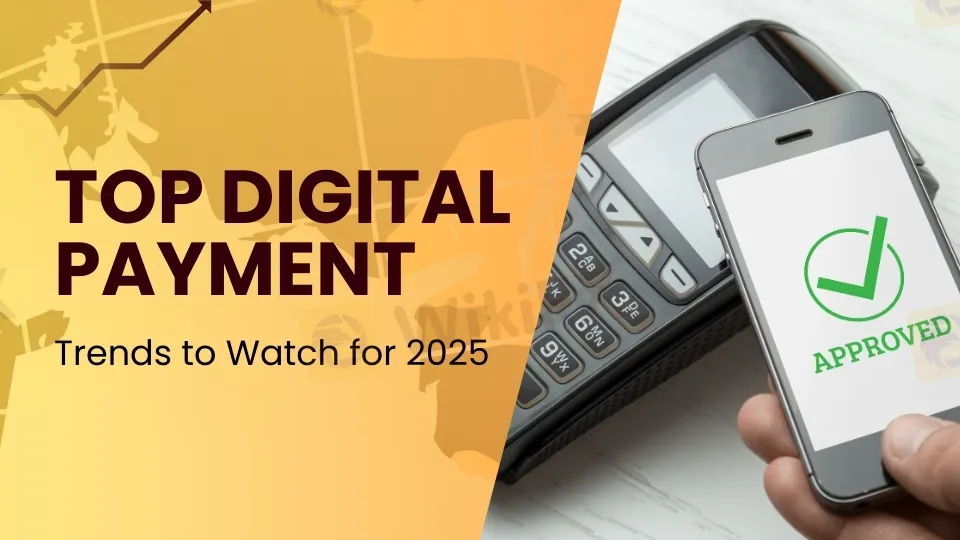简体中文
繁體中文
English
Pусский
日本語
ภาษาไทย
Tiếng Việt
Bahasa Indonesia
Español
हिन्दी
Filippiiniläinen
Français
Deutsch
Português
Türkçe
한국어
العربية
Top Digital Payment Trends to Watch for 2025
Abstract:Discover the top digital payment trends for 2025, including cryptocurrencies, contactless payments, and AI fraud detection, transforming global financial transactions.

The banking industry is fast developing as the rest of the world embraces digitization. Key payment trends are expected to revolutionize the way consumers and organizations trade by 2025. Contactless payments, cryptocurrencies, and innovative technologies such as Central Bank Digital Currencies (CBDCs) are gaining popularity throughout the world.
Cryptocurrencies and Stablecoins on the Rise
Cryptocurrency acceptance has shifted from niche to mainstream, thanks to the growing popularity of stablecoins. These digital currencies, which are tethered to stable assets such as the US dollar, provide the speed and cheap transaction costs of cryptocurrencies while limiting price volatility. As large firms like as PayPal accept stablecoins, we may anticipate further integration into cross-border payments and e-commerce in 2025.
Governments are also moving in with regulatory frameworks to oversee cryptocurrency's wider adoption. This legislative certainty is critical to ensure that companies and consumers may use digital assets for daily transactions in a secure and confident manner.
Contactless Payments: Continued Growth
Contactless payments have a bright future as customer tastes evolve to more convenient, safe, and quick payment alternatives. Tap-to-pay transactions will dominate retail, public transit, hospitality, healthcare, and wearables. Governments and companies throughout the globe are spending extensively on infrastructure to enable contactless technology, ensuring that it becomes a standard across established and developing economies.

CBDCs and National Currency Futures
The worldwide growth of Central Bank Digital Currencies (CBDCs) is an important trend to follow in 2025. China and the United States are spearheading trial initiatives aimed at streamlining cross-border transactions and increasing financial inclusion. Unlike decentralized cryptocurrencies such as Bitcoin, CBDCs provide a government-backed alternative with the potential to fundamentally transform global payment infrastructures and regulatory frameworks.
Buy Now, Pay Later Grows in 2025
Buy Now, Pay Later (BNPL) services are becoming more popular as customers seek more flexible payment choices. BNPL offers customers the ability to pay for products in interest-free installments, making it a popular option among younger buyers. However, regulatory monitoring is rising due to worries about consumer debt and term transparency, implying that new criteria will be developed to safeguard the viability of this payment option.
Detecting Fraud using AI and Machine Learning
As the number of digital payments grows, so do security risks. Financial institutions are investing in artificial intelligence (AI) and machine learning (ML) to tackle cybercrime. These modern techniques aid in the detection of Fraud in real time by analyzing large volumes of data and spotting suspicious patterns prior to transaction completion. As fraudsters grow more clever, AI will remain critical for increasing security and improving the whole payment experience.
Embedded Payments for Easy Transactions
The use of integrated payments is altering how customers engage with digital financial services. This technology enables non-financial platforms to integrate payment options directly into their offerings. Companies such as Uber and Amazon are already employing integrated payments, which allow customers to make purchases without leaving the site. As we approach 2025, this tendency will spread to areas such as e-commerce and healthcare, improving user experience and client retention.
Conclusion
Significant advancements, such as cryptocurrency, contactless payments, and AI-driven fraud detection, will shape the digital payment ecosystem in 2025. CBDCs and BNPL services are expanding, and companies and consumers must adapt to this changing financial ecology. Financial institutions, technology firms, and e-commerce organizations will be better positioned to handle the future of payments if they keep ahead of these trends.
Stay updated on the latest developments in the digital payment landscape! Visit WikiFX News now for more insights on upcoming trends shaping the financial world.

Disclaimer:
The views in this article only represent the author's personal views, and do not constitute investment advice on this platform. This platform does not guarantee the accuracy, completeness and timeliness of the information in the article, and will not be liable for any loss caused by the use of or reliance on the information in the article.
Read more

Authorities Alert: MAS Impersonation Scam Hits Singapore
MAS scam alert: Scammers impersonate officials, causing $614K losses in Singapore since March 2025. Learn how to spot and avoid this impersonation scam.

Billboard Warns of Crypto Scams Using Its Name – Stay Alert!
Billboard warns against fake crypto scams using its brand. Learn how to spot fraud and protect yourself from fake promotions.

Rising WhatsApp Scams Highlight Need for Stronger User Protections
UK consumers lose £2,437 on average to WhatsApp scams. Revolut demands stricter verification and AI monitoring to combat rising fraud on Meta platforms.

Interactive Brokers Launches Forecast Contracts in Canada for Market Predictions
Interactive Brokers introduces Forecast Contracts in Canada, enabling investors to trade on economic, political, and climate outcomes. Manage risk with ease.
WikiFX Broker
Latest News
The Withdrawal Trap: How Scam Brokers Lure Victims into Paying More
FCA to Investors: Think Twice Before Trusting These Brokers
Trump\s tariffs: How could they affect the UK and your money
Trump gambles it all on global tariffs he\s wanted for decades
TradingView Brings Live Market Charts to Telegram Users with New Mini App
Trump tariffs: How will India navigate a world on the brink of a trade war?
Interactive Brokers Launches Forecast Contracts in Canada for Market Predictions
Authorities Alert: MAS Impersonation Scam Hits Singapore
IG Group Acquires Freetrade for £160M to Expand UK Investment Market
U.S. March ISM Manufacturing PMI Released
Currency Calculator







